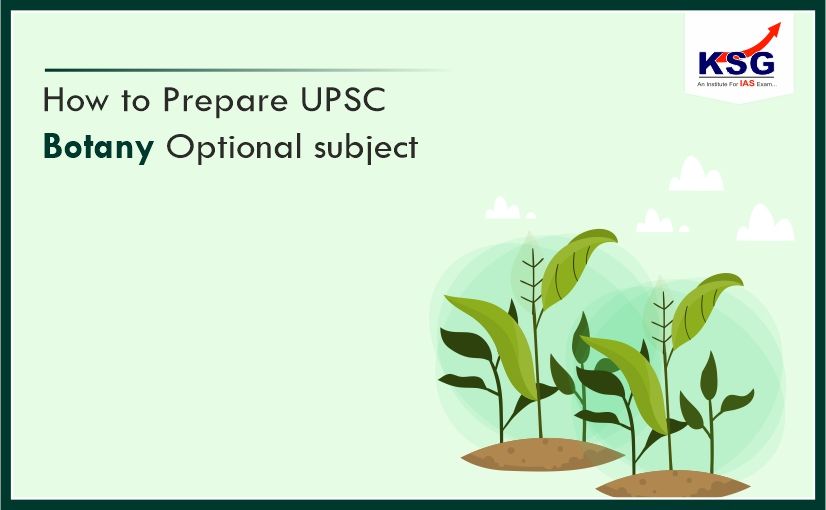How to Prepare UPSC Botany Optional Subject
Natural science or you can say Botany is one of the optional subjects that the UPSC offers competitors in the mains test. Very few up-and-comers pick it as it is a particular subject. Be that as it may, there have been a couple of toppers who had taken this optional subject (Gopala Sundara Raj, AIR 5/2011).
How to Prepare UPSC Botany Optional Subject
Natural science or you can say Botany is one of the optional subjects that the UPSC offers competitors in the mains test. Very few up-and-comers pick it as it is a particular subject. Be that as it may, there have been a couple of toppers who had taken this optional subject (Gopala Sundara Raj, AIR 5/2011). This article discusses Botany as a discretionary for the IAS mains test and gives a couple of tips to get ready for this optional subject.
Who should take Botany as an Optional Subject?
Candidates who have accepted Botany or Biology as their graduation major and are in contact with this subject can take this discretionary. Competitors who have lost touch yet at the same time as the subject or appreciate finding out about it can choose this subject.
Likewise, wannabes with a foundation in biotechnology can likewise select this discretionary subject.
Focal points of Botany optional:
- Being a science subject, it very well may be scoring.
- Nothing remains to translation and the inspector's close to home perspectives don't have any influence in stamping.
- The segments are practically static.
- Candidates need just to have their establishment clear and have reasonable lucidity to compose clever responses.
- You can score through outlines in this subject.
- The inquiries in this subject are immediate and crucial.
Prepare UPSC Botany Optional Subject (Proven Tips)
Botany is exceptionally scoring discretionary subjects in the UPSC IAS Mains test. This is one of the discretionary subjects that the UPSC offers competitors in the mains test. Relatively few applicants choose it as it is a specific subject. This article discusses Botany as a discretionary for the IAS mains test and gives a couple of tips to plan for this discretionary. It will be hard for any applicants who don't have earlier information on Botany and Agriculture.
- Understand your UPSC Civil Services Exam syllabus
- Select Best Reference Books and Guides
- Prepare a strong Study plan
- Prepare your own Preparation Notes
- Practice Previous year Question Papers
- Practice few Mock Test Papers for better results
UPSC Preparation Tips For Botany Optional
UPSC Aspirants need to pursue test tips to compose the test. Arrangement tips are required for any test. UPSC test ought to be led once inconsistently. Arranging and difficult work is essential to confronting any aggressive test. The following are a portion of the tips for readiness. The Paper I of Botany is which resembles General investigations and on graphs more in this paper. In any case, Paper-II of Botany discretionary arrangements with specialized ideas, for example, cell science, hereditary qualities, development, and atomic science.
Stage 1: Know UPSC Botany Syllabus and Schedule
Candidates are advised to visit the official site to check the complete exam schedule and exam pattern of the optional subject. Below you can find the most important aspect of how to prepare for the subject:
Paper I Strategy:
- Concentrate on charts more in this paper.
- Give Indian models additionally of species.
- Microbiology segment is generally significant for the 200 words short notes.
- The key regions in Phanerogams are:
- Gymnosperms: center around fossil sorts
- Angiosperms: get ready botanical charts and equations.
- Embryology: don't disregard graphs in this subject.
Paper-II Strategy:
- Under cell science, atomic viewpoint ought to be given significance.
- Hereditary qualities, development and atomic science are significant territories with high scoring potential.
- Competitors need to compose answers offering noticeable quality to applications in agribusiness and human welfare.
- In Physiology and Biochemistry areas, biochemical physiology is significant. In subjects like blooming, seed germination and natural product aging, applicants need to cover hormones and formative physiology.
Stage 2: Choose Best Reference Books
Find out the best reference books for UPSC Botany optional subject:
- Cell Biology by De Robertis & Ambrose
- Cryptograms by B.R. Vasista
- Embryology Of Angiosperms by S P Bhatnagar
- Genetics by Strickberger
- Microbiology by Powar
- Economic botany in the tropics by S. L. Kochhar
- Genetics by Dr. Veer BalaRastogi
- Plant Anatomy by B.P. Pandey
- Physiology and Biochemistry by Salisbury and Ross or Fritz
- Plant Anatomy by Esau
- Taxonomy by R Nair; Datta
Stage 3: Prepare A Study Plan
It is advisable to the candidates to prepare a study plan and follow it vigorously. More than this, do cover up all the important points and topics for the exam.
Stage 4: Practice and Practice
Practice makes a man perfect, you might hear this quote several times, and now it’s time to apply this quote in a real situation. Solve previous year papers and question papers for better understanding and knowledge of the subject.
Hope, this article titled “How to Prepare UPSC Botany Optional subject” gives detailed information about the tips for the preparation of the UPSC 2019 exam for all optional papers. Aspirants are advised to follow these tips and prepare well for the exam.



